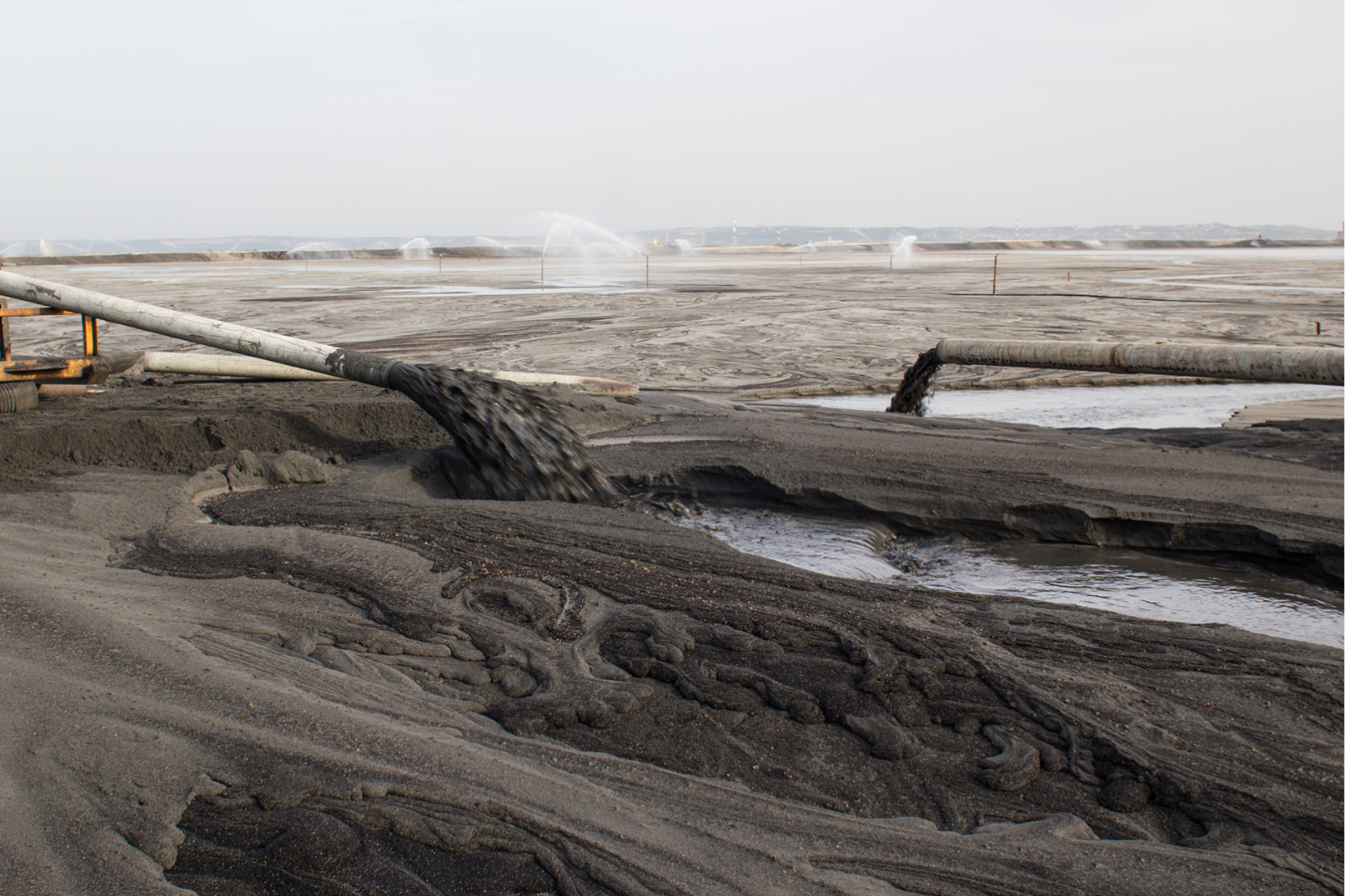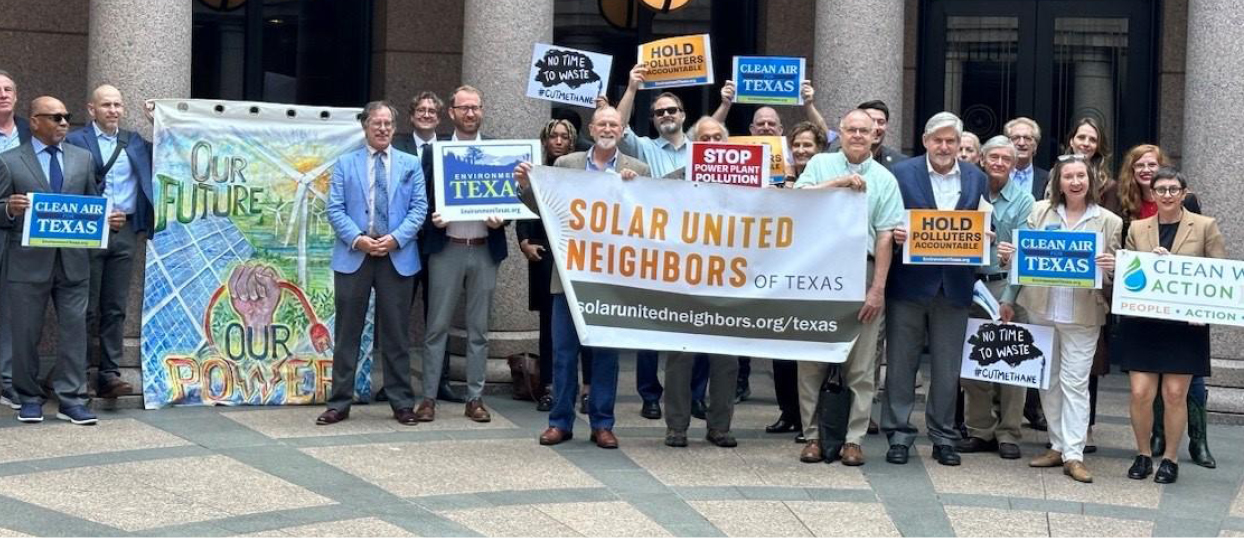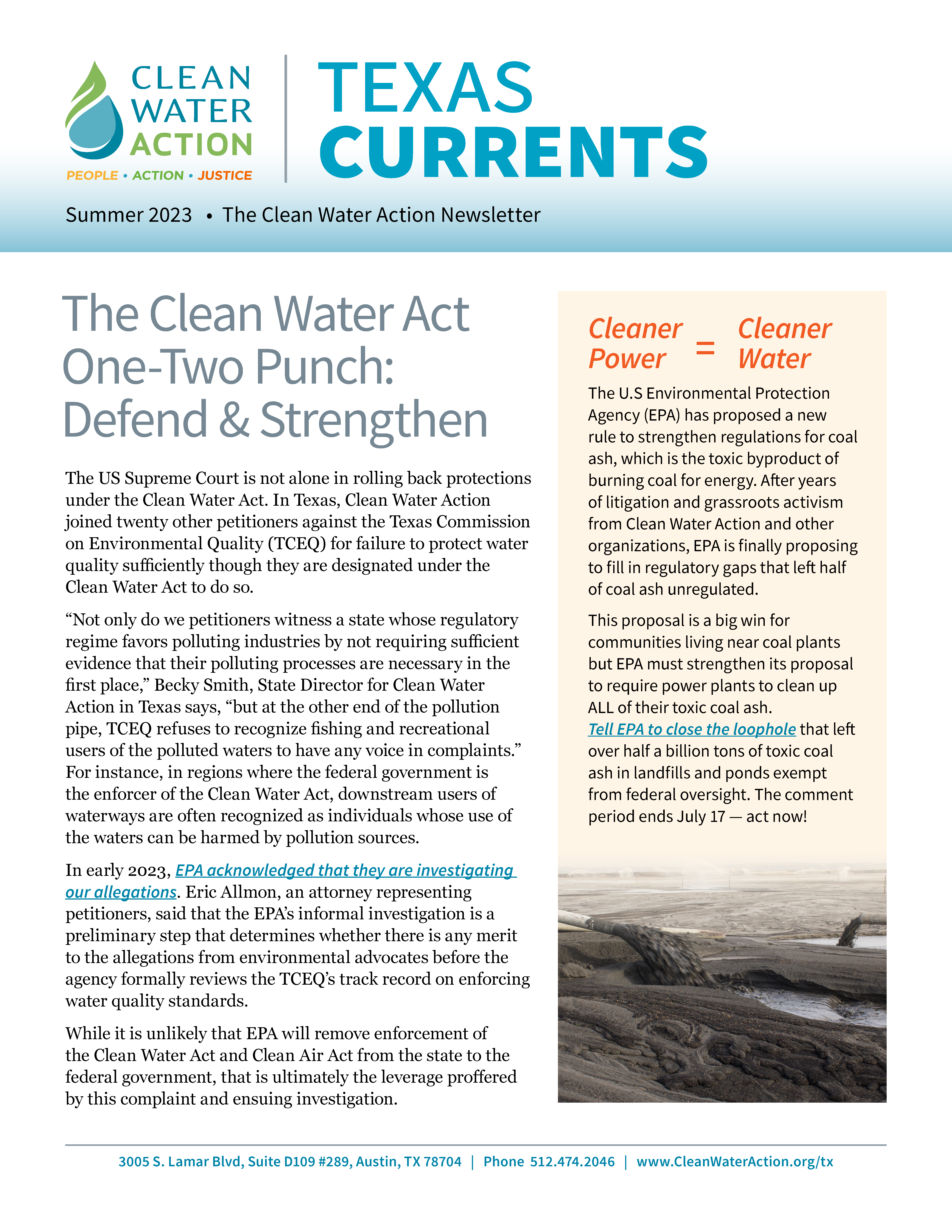In this Issue:
- The Clean Water Act One-Two Punch: Defend & Strengthen
- Clean Power = Clean Water
- Texas Legislature’s 88th Session: Know When to Hold ’Em, Know When to Fold ’Em…
- Bashing & Benefiting: Spring for Water Benefit & Bash
- The Sun Sets & Also Rises on the Texas Commission on Environmental Quality (TCEQ)
- Houston Flood Equity Victory
The Clean Water Act One-Two Punch: Defend & Strengthen
The US Supreme Court is not alone in rolling back protections under the Clean Water Act. In Texas, Clean Water Action joined twenty other petitioners against the Texas Commission on Environmental Quality (TCEQ) for failure to protect water quality sufficiently though they are designated under the Clean Water Act to do so.
“Not only do we petitioners witness a state whose regulatory regime favors polluting industries by not requiring sufficient evidence that their polluting processes are necessary in the first place,” Becky Smith, State Director for Clean Water Action in Texas says, “but at the other end of the pollution pipe, TCEQ refuses to recognize fishing and recreational users of the polluted waters to have any voice in complaints.” For instance, in regions where the federal government is the enforcer of the Clean Water Act, downstream users of waterways are often recognized as individuals whose use of the waters can be harmed by pollution sources.
In early 2023, EPA acknowledged that they are investigating our allegations. Eric Allmon, an attorney representing petitioners, said that the EPA’s informal investigation is a preliminary step that determines whether there is any merit to the allegations from environmental advocates before the agency formally reviews the TCEQ’s track record on enforcing water quality standards.
While it is unlikely that EPA will remove enforcement of the Clean Water Act and Clean Air Act from the state to the federal government, that is ultimately the leverage proffered by this complaint and ensuing investigation.

The U.S Environmental Protection Agency (EPA) has proposed a new rule to strengthen regulations for coal ash, which is the toxic byproduct of burning coal for energy. After years of litigation and grassroots activism from Clean Water Action and other organizations, EPA is finally proposing to fill in regulatory gaps that left half of coal ash unregulated.
This proposal is a big win for communities living near coal plants but EPA must strengthen its proposal
to require power plants to clean up ALL of their toxic coal ash.
Tell EPA to close the loophole that left over half a billion tons of toxic coal ash in landfills and ponds exempt from federal oversight. The comment period ends July 17 — act now!
Texas Legislature’s 88th Session: Know When to Hold ’Em, Know When to Fold ’Em…

Members of the Alliance for a Clean Texas (ACT) coalition at our ACT Lobby Day on April 11, 2023, gathered to educate our respective members on a suite of bills by our champions on environmental, clean energy, democracy, and public health issues. PHOTO: LUKE METZGER
The 88th Regular Session of the Texas Legislature was marked by fierce infighting between our House and Senate, controlled both indirectly by Governor Greg Abbott’s wishes and directly by Lt. Governor Dan Patrick’s gavel on the Senate side. Governor Abbott vetoed myriad Senate bills as “payback” to the Senate for resisting his agenda to cut property taxes. The final hours of the session were dedicated to the impeachment of our Attorney General, Ken Paxton, on charges including bribery, dereliction of duty, disregard of official duty, and obstruction of justice. While it appears truly the wild west here, there are numerous dedicated public servants who show up and do their jobs well. It is to them that we credit a few “wins’’ for the environment in this 88th session.
First, the “good”:
- House Bill (HB) 1699 provides for the Public Utility Commission (PUC) to create a framework allowing for renewable energy generators to aggregate energy generated by distributed participants such as homes, business solar, battery storage, etc.
- A dozen or so bills filed that would have set back renewable energy generation, transport and delivery, or capacity development were headed off, specifically an amendment to the reauthorization of the Texas Public Utility Commission which would have required a new type of “special”, widely limiting, permit for wind farms and solar farms all across Texas.
- In a win for transparency and public notification, Senate Bill (SB) 365 passed, requiring electric utilities to give notice to all landowners within 300 feet of a proposed transmission substation.
Next, the “bad”:
- SB 2627 provides subsidies for new gas power plants.
- SB 1017 prohibits cities from regulating diesel and gas fueled lawn equipment.
- SB 784 prohibits cities from regulating greenhouse gas emissions.
- SB 833 prohibits insurance companies from factoring in environmental, social, and governance (ESG) scores in underwriting and ratemaking decisions.
- Governor Abbott vetoed SB 2010 which would have improved enforcement and monitoring of the energy market to better protect consumers.
Now, the “ugly”:
- House Bill 2127, known as the “Super pre-emption” bill, unfortunately made it through to be signed by the Governor. This is a far-reaching bill which blocks cities from adopting nearly any regulations that go further than state law, including on environmental issues, but also issues including stopping puppy-breeding operations, granting construction professionals water breaks, and myriad local control issues;
- HB 5 reinstated Chapter 313, Subsidies for Polluters, who will not have to pay taxes into their local school districts. This not only incentivizes polluting industries to settle here, but adds to community pollution burdens, while excluding renewable energy businesses from receiving the benefit. A real lose-lose for Texans.
Bashing & Benefitting: Spring for Water Benefit & Bash
Sunday, June 4th, Barr Mansion, Austin: We sprang for the water with a festive gathering of activists, supporters, leaders, family, and Clean Water friends. Barr Mansion is an incredible specimen of the beauty of a certified organic campus and kitchen. In addition to a menu that our host and chef designed to be both easy on the planet AND delicious, we were regaled with live jazz piano by musician Rob Richardson of Austin’s The Blues Specialists and a spontaneous vocal offering by Go Austin/Vamos Austin’s Carmen D. Llanes, whose five-year organizational anniversary followed that next evening. What a treat!
In case we missed seeing you in-person for the great company, food, music, and celebration, it’s not too late to share your support for our work. Consider donating today.
We are so grateful for all of the support we had to host this fabulous evening. We would like to thank our incredible host Barr Mansion, our sponsors, and auction donors who provided an incredible lineup of silent auction items, Auction Chair Heidi Gibbons, musician Rob Richardson, an amazing lineup of volunteers, auctioneers Commissioner Brigid Shea and Roy Waley, special guest Jeff Carter, the hardworking professionals on staff at The Barr Mansion, and the many of you who came out to support us.
It is because of the support of this entire community that we are able to build upon Clean Water Action and Clean Water Fund’s 50+ year history and mission to protect our environment, health, economic well-being and community quality of life. Without our people, there would be no “people power.” We deeply appreciate your continued faith in our work and the support you show.
Please consider attending Barr Mansion’s Summer Series on good-for-the-planet AND good-for-our-bodies meals featuring guest chefs!
The Sun Sets & Also Rises on the Texas Commission on Environmental Quality (TCEQ)
In Texas, every state commission comes under review each twelve years, a process known as a “sunset review.” The 2023 docket included our primary environmental agency, the Texas Commission on Environmental Quality, known as TCEQ. Clean Water Action generated comments from our members to their elected leaders, and testified on record before both the Sunset Commission and the House Committee on Environmental Regulation for reforms including: the establishment of an Office of Environmental Justice within the agency; removing “economic development” from the mission of the agency; pressing for higher daily fines for polluting facilities; allowing Commissioners to deny permits based on consideration of cumulative impacts on communities where permits are sought and granted for polluting facilities; and to extend the public input times to increase public participation opportunities for permit and contested case hearings for community members.
While the final reforms included in the passage of reauthorization for TCEQ’s next twelve-year cycle lacked many of our desired reforms, higher daily fines for repeat polluting facilities made it across the finish line. We laid important groundwork to push the agency and subsequent legislative sessions for an Office of Environmental Justice and for the requirement that permit-granting agencies take into account cumulative impacts on surrounding communities when granting permits for polluting facilities. TCEQ was continued with these provisions upon signing into law Senate Bill 1397 by Governor Abbott.
This month, the City of Houston’s annual budget was finalized and included hard-fought funding for drainage spending that will focus on flood infrastructure, increased drainage maintenance, and flooding prevention.
Clean Water Action is proud of the work of our fellow Houstonians at Northeast Action Collaborative/Noreste Acción Colectivo leading this win for real reform and meaningful flood protection & recovery for neighborhoods and communities that have long been victims of under-investment. This budget action is a move in the right direction towards more equitable distribution of funding to help ensure that all Houstonians have access to resilient infrastructure.

